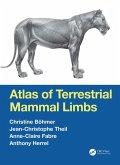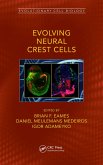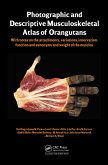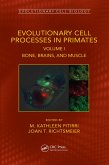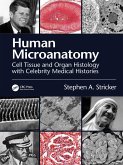Atlas of Terrestrial Mammal Limbs (eBook, PDF)


Alle Infos zum eBook verschenken

Atlas of Terrestrial Mammal Limbs (eBook, PDF)
- Format: PDF
- Merkliste
- Auf die Merkliste
- Bewerten Bewerten
- Teilen
- Produkt teilen
- Produkterinnerung
- Produkterinnerung

Hier können Sie sich einloggen

Bitte loggen Sie sich zunächst in Ihr Kundenkonto ein oder registrieren Sie sich bei bücher.de, um das eBook-Abo tolino select nutzen zu können.
This book is an atlas of limbs in terrestrial mammals. Diversity is highlighted with comprehensive phylogenetic coverage of front and hind limbs. Ecological diversity is also targeted with different locomotor ecologies (aquatic, terrestrial, arboreal). Standardized views of the limb musculature include external, internal, and isolated elements as well as in connection to the rest of the body, and at different stages of dissection. Illustrations with the origins and insertions of muscles will use standardized color code. A summary/discussion highlighting differences between phylogenetic groups…mehr
- Geräte: PC
- ohne Kopierschutz
- eBook Hilfe
- Größe: 76.76MB
![Atlas of Terrestrial Mammal Limbs (eBook, ePUB) Atlas of Terrestrial Mammal Limbs (eBook, ePUB)]() Christine BöhmerAtlas of Terrestrial Mammal Limbs (eBook, ePUB)39,95 €
Christine BöhmerAtlas of Terrestrial Mammal Limbs (eBook, ePUB)39,95 €![Evolving Neural Crest Cells (eBook, PDF) Evolving Neural Crest Cells (eBook, PDF)]() Evolving Neural Crest Cells (eBook, PDF)52,95 €
Evolving Neural Crest Cells (eBook, PDF)52,95 €![Photographic and Descriptive Musculoskeletal Atlas of Orangutans (eBook, PDF) Photographic and Descriptive Musculoskeletal Atlas of Orangutans (eBook, PDF)]() Rui DiogoPhotographic and Descriptive Musculoskeletal Atlas of Orangutans (eBook, PDF)65,95 €
Rui DiogoPhotographic and Descriptive Musculoskeletal Atlas of Orangutans (eBook, PDF)65,95 €![Fish Cytogenetic Techniques (eBook, PDF) Fish Cytogenetic Techniques (eBook, PDF)]() Fish Cytogenetic Techniques (eBook, PDF)65,95 €
Fish Cytogenetic Techniques (eBook, PDF)65,95 €![Evolutionary Cell Processes in Primates (eBook, PDF) Evolutionary Cell Processes in Primates (eBook, PDF)]() Evolutionary Cell Processes in Primates (eBook, PDF)47,95 €
Evolutionary Cell Processes in Primates (eBook, PDF)47,95 €![Osmotic and Ionic Regulation (eBook, PDF) Osmotic and Ionic Regulation (eBook, PDF)]() Osmotic and Ionic Regulation (eBook, PDF)65,95 €
Osmotic and Ionic Regulation (eBook, PDF)65,95 €![Human Microanatomy (eBook, PDF) Human Microanatomy (eBook, PDF)]() Stephen A. StrickerHuman Microanatomy (eBook, PDF)88,95 €
Stephen A. StrickerHuman Microanatomy (eBook, PDF)88,95 €-
-
-
Dieser Download kann aus rechtlichen Gründen nur mit Rechnungsadresse in A, B, BG, CY, CZ, D, DK, EW, E, FIN, F, GR, HR, H, IRL, I, LT, L, LR, M, NL, PL, P, R, S, SLO, SK ausgeliefert werden.
- Produktdetails
- Verlag: Taylor & Francis eBooks
- Seitenzahl: 403
- Erscheinungstermin: 3. April 2020
- Englisch
- ISBN-13: 9781351784092
- Artikelnr.: 59075845
- Verlag: Taylor & Francis eBooks
- Seitenzahl: 403
- Erscheinungstermin: 3. April 2020
- Englisch
- ISBN-13: 9781351784092
- Artikelnr.: 59075845
- Herstellerkennzeichnung Die Herstellerinformationen sind derzeit nicht verfügbar.
Jean-Christophe Theil. Interested in animals, anatomy and osteology since his childhood he started an osteological collection leading him to learn more about animals. Re-assembling skulls and skeletons of all kinds of vertebrates is the crossing of a scientific and artistic process that he has come to love. During his studies, he met Anthony Herrel who introduced him to the world of muscles. After earning a Master's degree in Systematics, Evolution and Paleontology at the Museum National d'Histoire Naturelle in Paris, he joined the FUNEVOL team as temporary dissection worker and bone preparator. He is very happy to combine his understanding of both muscles and bones which are very complementary.
Anne-Claire Fabre is an evolutionary biologist and functional morphologist principally interested in shape evolution. Her research on macroevolution is highly integrative, linking different research areas in biology in order to understand the evolution of the shape of a structure in relation to development, function and behavior. She earned her PhD from University College London and did postdocs as a Fondation Fyssen fellow at Duke University (USA) and as a Marie-Sklodowska Curie fellow at the Museum National d'Histoire Naturelle (France). She is currently working as a research co-investigator at the Natural History Museum (UK).
Anthony Herrel is a research director of the CNRS working at the Museum National d'Histoire Naturelle. His main interests are the evolution of the vertebrate feeding and locomotor systems. He is by training a comparative anatomist with a keen interest in functional morphology and biomechanics. He earned his PhD from the University of Antwerp in Belgium and did postdocs at the University of Antwerp in Belgium, Northern Arizona University, Tulane University and Harvard University in the US before landing a job at the CNRS. He now runs the Function and Evolution team of the UMR7179 at the Museum in Paris.
Part I
Chapter 1 Limbs and Locomotion
Chapter 2 Comparative Anatomy
2.1 Anatomical Terms of Location
2.2 Limb skeleton
2.3 Limb musculature
2.4 Muscle maps
Part II
Chapter 1 Martes foina (European stone marten)
Chapter 2 Meles meles (European badger)
Chapter 3 Nasua nasua (South American coati)
Chapter 4 Potos flavus (Kinkajou)
Chapter 5 Cuon alpinus (Dhole)
Chapter 6 Vulpes vulpes (Red fox)
Chapter 7 Herpestes auropunctatus (Small Indian mongoose)
Chapter 8 Cryptoprocta ferox (Fossa)
Chapter 9 Hyaena hyaena (Striped hyena)
Chapter 10 Acinonyx jubatus (Cheetah)
Chapter 11 Panthera leo (Lion)
Chapter 12 Manis tricuspis (Tree pangolin)
Chapter 13 Sus scrofa (Wild boar)
Chapter 14 Capreolus capreolus (European roe deer)
Chapter 15 Erinaceus europaeus (European hedgehog)
Chapter 16 Chiropotes satanas (Brown-bearded saki)
Chapter 17 Cuniculus oryctolagus (European rabbit)
Chapter 18 Laonastes aenigmamus (Laotian rock rat or kha-nyou)
Chapter 19 Octodon degus (Degu)
Chapter 20 Sciurus vulgaris (Eurasion red squirrel)
Chapter 21 Pedetes capensis (Springhare)
Chapter 22 Mesocricetus auratus (Golden hamster)
Chapter 23 Meriones unguiculatus (Mongolian gerbil)
Chapter 24 Rattus norvegicus (Norway rat)
Chapter 25 Elephantulus brachyrhynchus (Short-snouted elephant shrew)
Chapter 26 Bradypus tridactylus (Pale-Throated Three-Toed sloth)
Chapter 27 Dasyurus viverrinus (Easter quoll)
Chapter 28 Philander opoussum (Gray four-eyed opossum)
Part III
Muscle synonyms
Non-exhaustive list of references on mammalian limb muscle anatomy
Index
Part I
Chapter 1 Limbs and Locomotion
Chapter 2 Comparative Anatomy
2.1 Anatomical Terms of Location
2.2 Limb skeleton
2.3 Limb musculature
2.4 Muscle maps
Part II
Chapter 1 Martes foina (European stone marten)
Chapter 2 Meles meles (European badger)
Chapter 3 Nasua nasua (South American coati)
Chapter 4 Potos flavus (Kinkajou)
Chapter 5 Cuon alpinus (Dhole)
Chapter 6 Vulpes vulpes (Red fox)
Chapter 7 Herpestes auropunctatus (Small Indian mongoose)
Chapter 8 Cryptoprocta ferox (Fossa)
Chapter 9 Hyaena hyaena (Striped hyena)
Chapter 10 Acinonyx jubatus (Cheetah)
Chapter 11 Panthera leo (Lion)
Chapter 12 Manis tricuspis (Tree pangolin)
Chapter 13 Sus scrofa (Wild boar)
Chapter 14 Capreolus capreolus (European roe deer)
Chapter 15 Erinaceus europaeus (European hedgehog)
Chapter 16 Chiropotes satanas (Brown-bearded saki)
Chapter 17 Cuniculus oryctolagus (European rabbit)
Chapter 18 Laonastes aenigmamus (Laotian rock rat or kha-nyou)
Chapter 19 Octodon degus (Degu)
Chapter 20 Sciurus vulgaris (Eurasion red squirrel)
Chapter 21 Pedetes capensis (Springhare)
Chapter 22 Mesocricetus auratus (Golden hamster)
Chapter 23 Meriones unguiculatus (Mongolian gerbil)
Chapter 24 Rattus norvegicus (Norway rat)
Chapter 25 Elephantulus brachyrhynchus (Short-snouted elephant shrew)
Chapter 26 Bradypus tridactylus (Pale-Throated Three-Toed sloth)
Chapter 27 Dasyurus viverrinus (Easter quoll)
Chapter 28 Philander opoussum (Gray four-eyed opossum)
Part III
Muscle synonyms
Non-exhaustive list of references on mammalian limb muscle anatomy
Index

